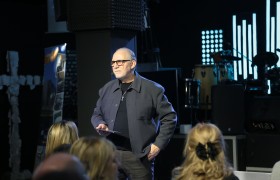The Blood and Bread of Blessing
PREACHING ON DECEMBER 15, 2024:
Pastor Antonio Russo
THE BLOOD AND BREAD OF BLESSING
In this worship service, we have prepared to celebrate "the Lord's Supper," a supernatural moment that proclaims Christ's victory and His sacrifice on the cross, an act of faith that the enemy cannot withstand. As we approach His table, unleashing spiritual warfare against darkness, we must be determined and vigilant, fighting steadfastly to see God's glory in our lives. "Praying in tongues" is one of the most powerful weapons against the enemy because it aligns us with God's will and strengthens us to withstand his attacks. Likewise, "praise and worship" are effective spiritual weapons that the devil cannot endure because they declare God's sovereignty over every circumstance and open us to His presence. At this time of year, while the world celebrates the birth of Jesus, we must remember that what truly matters is the certainty that He came into the world, bringing hope, strength, and salvation. Praise and worship are particularly meaningful during this season because they help us overcome painful memories and fill the void left by the absence of loved ones. These thoughts can lead us to sadness and depression, but we must not allow them to affect our minds, for the Bible exhorts us to comfort one another with these words.
Psalm 34:1; 1 will bless the Lord at all times: his praise shall continually be in my mouth.
Our praise should not depend on circumstances but must be an expression of our love for God, who is faithful and wonderful. Therefore, we now want to address a crucial topic: "relationships," because God desires to heal relationships within families, between husband and wife, between parents and children, and even within the body of Christ. The family, which should be the place of greatest blessing, often becomes a battlefield where conflicts and divisions accumulate. Sometimes, small unresolved issues, like "the little foxes that ruin the vineyards" (Song of Solomon 2:15), build walls of separation and prevent us from seeing the beauty in each other’s lives. However, God wants to tear down these walls and bring miracles into our relationships. Yet, we must also be willing to allow God to transform us, as we often think it is others who need to change. To understand the depth of the Lord's Supper, let us read a scripture from the First Letter to the Corinthians, where the apostle Paul writes:
1Corinthians 11:23-26; 23 For I have received of the Lord that which also I delivered unto you, That the Lord Jesus the same night in which he was betrayed took bread: 24 And when he had given thanks, he brake it, and said, Take, eat: this is my body, which is broken for you: this do in remembrance of me. 25 After the same manner also he took the cup, when he had supped, saying, This cup is the new testament in my blood: this do ye, as oft as ye drink it, in remembrance of me. 26 For as often as ye eat this bread, and drink this cup, ye do shew the Lord's death till he come.
Even though he did not participate in the Last Supper, the apostle Paul received this truth directly from the Lord as a supernatural revelation, about eight years after the death and resurrection of Jesus. Furthermore, he emphasizes the significance of this act, saying that the Lord’s Supper is a memorial because the bread and the cup remind us of Christ’s sacrifice on the cross and point us toward the future, when He will return in His glory. Jesus celebrated the Supper "on the night He was betrayed," an important detail because betrayal causes deep pain, destroying trust and wounding the soul. Yet, He did not let betrayal overcome Him but responded to disloyalty with faithfulness, to curses with blessings, and to pain with the eternal covenant. The broken bread represents His body given for us, and the cup represents His blood, which establishes the new covenant. As declared in 1Corinthians 10:16, the cup is called "the cup of blessing" because it signifies communion with the blood of Christ, while the broken bread represents "communion with His body." These symbols, the bread and wine, become instruments of spiritual blessing, leading us to reflect on Jesus' sacrifice and its transformative meaning. By partaking in the cup, we are redeemed through the blood of Jesus, which does not merely cover sins but erases them completely, making us new creations in Christ; this is not a mere restoration but a total and radical transformation. Do you want to know our worth and the worth of Jesus' blood? Our worth is immense: God determined that we are worth the price of His Son’s blood, through which we have been washed. Through the bread and the cup, we not only remember Christ’s sacrifice but also partake in the unity of His body, the Church a unity that draws abundant blessings from God, who delights in oneness. This truth is beautifully expressed in the Psalms, where unity is described as something good, precious, and pleasing:
Psalm 133:1-3; 1 Behold, how good and how pleasant it is for brethren to dwell together in unity! 2 It is like the precious ointment upon the head, that ran down upon the beard, even Aaron's beard: that went down to the skirts of his garments; 3 As the dew of Hermon, and as the dew that descended upon the mountains of Zion: for there the Lord commanded the blessing, even life for evermore.
The image of oil flowing from the head down to the edge of the garments highlights the completeness of God's blessing, which extends to every part of the body. Furthermore, the Psalm declares that God has established eternal life and His blessing precisely in unity, whereas division, on the contrary, brings no blessing. This principle directly connects to the words of Jesus.
John 17:21; 21 That they all may be one; as thou, Father, art in me, and I in thee, that they also may be one in us: that the world may believe that thou hast sent me.
Therefore, unity is essential for the world to believe the message of the Gospel, but it is not just about us as believers; it is founded on being “one in Christ.” To achieve it, we must "die to ourselves," to our thoughts, ambitions, and desires, allowing Christ to grow within us, as John the Baptist declared: “He must increase, and I must decrease.” Returning to the Apostle Paul, he concludes his teaching on the Lord’s Supper with a clear exhortation to “self-examination.” In 1Corinthians 11:28, we read: “Let a person examine himself,” which means reflecting on our spiritual walk, our actions, and our words. We must not judge others but evaluate ourselves: Are we a source of blessing to our brothers and sisters? Partaking in the Lord’s Supper with a sincere heart requires honest self-examination, for the "bread of blessing" is not only about communion with Christ but also about what we confess with our mouths. Paul warns that those who partake of the Supper superficially or unworthily deprive themselves of the outpouring of blessings that God desires to bestow and risk facing unfortunate consequences:
1Corinthians 11:30; 30 For this cause many are weak and sickly among you, and many sleep.
In this verse, Paul is not speaking of an unavoidable premature death but rather of a direct consequence of superficiality and the failure to discern the body and blood of the Lord. Disrespect and lack of seriousness toward the Lord's Supper bring judgment upon oneself and prevent living in blessing, clearly highlighting the importance of obedience and holiness. Often, curses are only associated with occult practices, such as magic and witchcraft, but disobedience and rebellion are likened to witchcraft itself, as the prophet Samuel teaches us. He affirms that God desires an obedient heart more than sacrifices and external rituals. The apostle Peter gives us a clear exhortation regarding communal life.
1Peter 3:8-12; 8 Finally, be ye all of one mind, having compassion one of another, love as brethren, be pitiful, be courteous: 9 Not rendering evil for evil, or railing for railing: but contrariwise blessing; knowing that ye are thereunto called, that ye should inherit a blessing. 10 For he that will love life, and see good days, let him refrain his tongue from evil, and his lips that they speak no guile: 11 Let him eschew evil, and do good; let him seek peace, and ensue it. 12 For the eyes of the Lord are over the righteous, and his ears are open unto their prayers: but the face of the Lord is against them that do evil.
These verses urge us to live in harmony, setting aside selfishness and cultivating brotherly love, compassion, humility, and kindness. They call us to respond to evil with good and to bless those who offend us because we are called to do so in order to inherit a blessing. True blessing, according to Peter, arises from obedience to God, refraining from speaking evil, doing good, and pursuing peace, for God listens to the righteous and opposes the wicked, teaching us that a life honoring His Word leads to lasting blessings. The apostle James addresses a crucial topic in chapter 3 of his letter, warning against the improper use of the tongue. He states that those who desire to teach will receive stricter judgment because words have immense power. The tongue is likened to the bit in a horse's mouth and the rudder of a ship: though small, it controls and guides the entire body. Similarly, a single wrong word, like a spark, can set an entire forest on fire, causing destruction. The ability to tame the tongue is essential for guiding our lives toward blessing. James teaches that anyone who does not stumble in what they say is a perfect and mature person, capable of controlling themselves and their whole body. If misused, the tongue can bring curse and ruin; if controlled and used wisely, it can bring blessing and life. Thus, James, Peter, and Paul all speak of the same principle: the power of the tongue. James teaches that full blessing is reserved for those who, though not perfect, learn to control their words. Restraining the tongue demonstrates self-love and the desire for a long and blessed life, like Moses, who died at 120 years old with his strength and eyesight intact, or Abraham, who departed life with joy. To live this way, we must grow in spiritual maturity and control our tongues. The apostle Paul exhorts us not to judge anything before the appointed time, for judgment belongs to God. He is the God of all hope and renews His mercy every day. Therefore, let us declare with faith: “2025 will be the best year of my life!” confident that God will reserve new blessings for those who control their tongues, act with maturity, and walk in His will. James asks a crucial question: Can we restrain our tongues from evil and inherit the blessing? The answer is yes, and he offers three valuable pieces of advice to achieve this:
The first advice is: “Listen well before you speak.”
James 1:19; 19 Wherefore, my beloved brethren, let every man be swift to hear, slow to speak, slow to wrath:
God has given us two ears and one mouth: we must listen twice as much as we speak because being quick to listen and slow to speak also helps us be slow to anger, avoiding impulsive reactions. Often, we misinterpret what is said, drawing hasty conclusions or judging with prejudice without listening carefully, and this attitude damages relationships and hinders mutual understanding.
Proverbs 18:13; 13 He that answereth a matter before he heareth it, it is folly and shame unto him.
We should not respond without understanding, because this reveals immaturity and a lack of wisdom. Even Peter, before his maturity, misunderstood the words of Jesus simply because he had not listened carefully.
John 21:22; 22 Jesus saith unto him, If I will that he tarry till I come, what is that to thee? follow thou me.
So, Peter misunderstood, and as a result, a wrong message spread among the brothers.
The second piece of advice is: "Speak with gentleness."
Words can wound like swords or bring healing; for this reason, we must remember that those who listen to us are precious people, created in the image and likeness of God, purified by the blood of Jesus, and deserving of respect and love.
Proverbs 15:1; 1 A soft answer turneth away wrath: but grievous words stir up anger.
This encourages us to respond with kindness, even in difficult situations, so that our words can bring healing and not cause harm.
Proverbs 12:18; 18 There is that speaketh like the piercings of a sword: but the tongue of the wise is health.
We must reflect before speaking, because it is essential that our words are connected to our hearts and to the Word of God, in order to build up and encourage those who listen to us, as the Apostle Paul urges us to do.
Ephesians 4:29; 29 Let no corrupt communication proceed out of your mouth, but that which is good to the use of edifying, that it may minister grace unto the hearers.
Words must nourish and build trust, not destroy, because those who receive inappropriate words may feel hurt, as happens with a difficult diagnosis made worse by negative words. Yet Christ, the author of life, calls us to speak words of health, peace, and hope.
Proverbs 10:11 reminds us that "the mouth of the righteous is a fountain of life," and Proverbs 10:21 adds: "The lips of the righteous nourish many."
Let us choose to be instruments of life, not death, speaking with wisdom and love to glorify God and bless others.
The third piece of advice is: “When we tell something, do not add unnecessary details.”
Do you know what Jesus told us? “Let your yes be yes, and your no be no; anything more comes from the evil one.” Every time we add something, we risk being inspired by the evil one, not by the Holy Spirit. Think about gossip: a story starts with one brother, goes to another, and then to another, changing at each step, so that the person who hears the last version will no longer know what really happened to the first brother. Let us avoid additions or distortions, because our words should bring blessing, not division. We are the body of Christ, and our words must bring blessing to the lives of our brothers, sisters, and everyone we meet, because blessed words can make a difference in both our lives and theirs.























